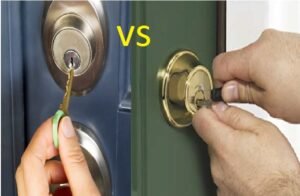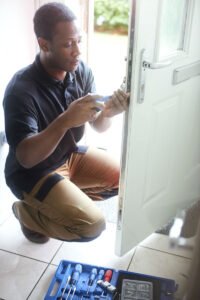
When homeowners find out that rekeying a lock is something like finding a trinket, there is always this small interesting look of curiosity on their faces. Most of them view the term as sounding like something that could be done with magic. If you have not encountered this term before, that is perfectly fine, you are not alone. With very few exceptions, homeowners choose to change the locks instead of rekeying them. However, not necessarily is a positive message because while changing your door locks may be the best option for you, not necessarily is the only option.
When you are forced to replace your entire door lock, you may end up with a poor-quality one. However, if you choose to rekey your door locks, you might find a better option. There is no need to worry about finding a way to choose the right option because no matter which option you select, you will have no problem selecting the best option for your home. Today, I will be on the lookout for the correct answer to this question and assist you along the way. In order to accomplish this, we must take a closer look at what rekeying and replacing a lock entail, and also see how locks and doors can impact your home, as well as various other aspects that might influence your decision.
A good locksmith will first determine whether the customer simply needs the locks rekeyed or if the locks must be replaced. Many customers are unaware that they have a choice or which option is best for them.
Rekeying Locks

When you hear the term rekey, you may want to learn more about the term and the way it works. To a certain extent, you are trying to readjust the internal workings of the lock so that it works with a different key, without damaging the security of your home. On the surface, this may appear to be simple, but for those who are not highly trained locksmiths, it can be rather difficult to accomplish. A paraphrase: In the simplest terms, you will keep your old lock, but the key you once had will no longer work with the lock. It is absolutely essential that you fully comprehend this fundamental concept before you start diving down the rabbit hole of lock rekeying. The process of rekeying the lock is cost-effective because it utilizes the existing lock body, but some things need to be reworked to ensure the lock functions with a different key than before.
A locksmith rekeys a lock by removing the pins and springs from the lock cylinder and replacing them with new pins and springs that work with a new and different key. Unless a lock is broken or a completely different style is desired, many locks can be rekeyed and kept in service, functioning as well as or better than before.
The most common reason for rekeying locks is to maintain key control when a property’s ownership changes. Key control simply means keeping track of all keys used to open locks. Key control is lost once keys are loaned out. Obviously, you don’t know who may have had access to the keys in a previously owned home. Contractors have had access to keys in new homes.
Locks are often construction master keyed in many single-builder communities. While using the homeowner’s key may prevent the use of the contractor’s key to match in the future, master pins are frequently left in the lock. Each master pin increases the number of keys that can be used to open the lock. In many cases, up to 16 different keys could be used to operate the locks on a single home. Rekeying would eliminate the possibility of another key operating the locks by removing these master pins.
To Rekey or not to Rekey – The Lock Choice is Yours
Rekeying allows a locksmith to inspect the lock and its installation. Many issues can be resolved without changing the lock. When locks are rekeyed, they are typically lubricated, which allows them to operate much more smoothly. However, problems may be discovered that indicate that a lock needs to be replaced.
Some lock manufacturers sell locks that can be rekeyed by the end user. These aren’t the traditional pin tumbler locks that have long been the backbone of the lock industry. Allowing rekeying without disassembly introduces a slew of new intricate parts that can cause malfunctions and are easier to circumvent than traditional locks.
Benefits of Rekeying vs Replacing – Security for your Home
So…. is it better to rekey or to change locks in your home? Here are some benefits to consider or rekeying your locks in decision.
1.) Better Sense of Security
It’s a common misconception that rekeying your locks can give you a sense of increased security. Because it is a simple method of resetting your key control (rekey) and nullifying all other keys that could have operated your lock, this is an effective means of minimizing the possibility of having other keys activate your lock. The term “homeowner” is applied to anyone who is moving into a new residence and taking over a lease, as soon as they have moved in. This is why people lock their doors because, as the above passage suggests, prior owners or any potential intruders can easily gain access to their home if a key is not locked away safely. In conclusion, it effectively seals up any remaining loose ends that may be apparent in their security, and it gives them a fresh start in a way.
2.) Lower Costs
When it comes to rekeying the lock, the most important components to change are the key pins, which are usually located within the lock cylinder. For just a few dollars, these crucial pins can be extremely affordable, especially when compared to the price of a new lock set. It makes rekeying an extremely affordable option for homeowners who would like to change one aspect of their security without having to spend a great deal of money. As far as your money goes, you will have to pay for the labor cost when you call a locksmith, or the amount of time you will have to invest trying to assemble it yourself.
3.) Easy to Install
While most professionals agree that a basic rekey is not a big task, some doubt the practicality of rekeying, which can be extremely fast and convenient but does not call for a lot of people or the use of tools. Other than a key decoder, a catch tool, spanner, and the current key for the lock that needs to be rekeyed, you only need to know how to do it. If you have never done it before, it could take you significantly longer to finish, but this can be said of anyone who is attempting to replace their locks without the aid of a locksmith and requires regular maintenance often.
Changing or Replacing Locks
When rekeying the lock, you will be using a completely different (and possibly brand new) lock, and that is why the process is considered to be more complicated. In the vast majority of cases, replacing a lock means the lock body will be completely different. Rekeying the lock has its drawbacks, but on the other hand, replacing the lock completely is more costly. It is a good guess that it is due to the higher cost of replacement front locksets, but this can also be due to the additional time, labor, and expense associated with installing a new lockset on an old door. In addition to what was mentioned above, you do not need to repeat this step when rekeying the real lock. You will have to find out what lock you would like to replace it with first in order to change the lock.
Locks must be replaced under certain conditions. Locks do wear out, sometimes to the point where rekeying can improve their functionality. It’s never a bad idea to upgrade your locks. When you consider who and what your locks are protecting, it only makes sense to invest in high-quality locking hardware.
Some people may want to change their locks for purely cosmetic reasons or to accommodate disabilities. Lever handle locks are more visually appealing and easier to use than knob locks. Similarly, deadbolts with an interior thumb turn that can be operated without grasping are available. Electronic locks are also becoming increasingly popular, but it is important to remember that what they provide is convenience rather than security.

Benefits of Home Lock Replacement
1.) Customizable
When you purchase new locks, you get the opportunity to choose the exact kind of security you want. This is something many homeowners take for granted. When I use the term customize in this section, I am referring to the fact that you have the ability to influence the way your locks look and feel, as well as the way they work alongside some of the other components of your home security. To secure your lock and protect your belongings, you can use longer screws. In case you need to insert additional security pins, feel free to do so. Your lock is being replaced, which gives you a completely new surface to work with when it comes to security.
2.) Easy to Upgrade the Lock
If you decide to replace your locks rather than rekeying them, you have the benefit of being able to upgrade your locks, making your home security better. The fact that you can improve on the security measures you already had in place is the ultimate meaning of this statement. For instance, if you had a Grade 2 deadbolt installed on your door, you would not be able to opt to upgrade your lock to a Grade 1 deadbolt by rekeying. On the flip side, you could make the opposite decision and choose to install more modern smart locks instead of traditional locks. Regardless of whatever the case may be, you now have the ability and the option to upgrade your locks when you replace them.

Consultation with a professional locksmith may be the most effective way to determine what you require. Rekeying is unquestionably the more cost-effective option. If you need or want to replace your locks, your locksmith will have access to far better hardware than what is commonly found in hardware stores.


No Comments
Be the first to start a conversation